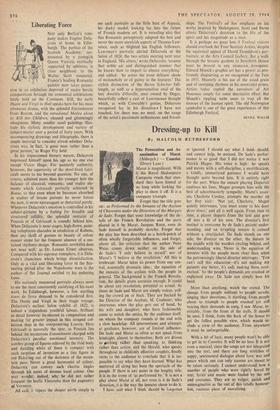Dressing-up to Kill
By MALCOLM RUTHERFORD
The Persecution and As-
ii,414■111 el." sassination of Marat.
(Aldwych.) — Camelot. (Drury Lane.) Marat is magnificent. With it the Royal Shakespeare Company reach that stan- dard they have hinted at so long while lacking the play to show it off. It is a company triumph.
Forget that the title goes on: as Performed by the Inmates of the Asylum of Charenton under the Direction of the Marquis de Sade. Forget that your knowledge of the de- tails of the French Revolution and the parts played in it by Marat, Jacques Roux, even de Sade himself is probably sketchy. Forget that the play has been described as a hotch-potch of often wholly forgettable influences, and forget, above all, the criticism that the author Peter Weiss comes down neither on the side of de Sade's 'I only believe in myself' nor of Marat's 'I believe in the revolution.' All this is irrelevant. Marat takes its power from one cen- tral, essentially dramatic idea: the equation of the inmates of the asylum with the people in general. The background is the French Revolu- tion, the details given accurate enough. It could be about any revolution, potential or actual. At times de Sade and Marat are simply voices, yell- ing the crowd on or back. They are backed by the Director of the Asylum, M. Coulmier, who intervenes when the play gets out of hand, by his wife and daughter, who have fashionably come to watch the antics, by the audience .itself, on whom the company rounds at the end with a slow handclap. All interventions and attempts at guidance, however, are of limited influence. De Sade and Marat as often as not speak from hindsight, almost to themselves. Both are driven to *writing rather than speaking, to thinking rather than action, and the Herald, who speaks throughout in childishly effective couplets, finally turns to the audience to conclude that it is im- possible to say what they have learned. What has mattered all along has been the spectacle of the people. If there is any point in the lengthy title, it is in the irony of `as performed by.' It is not a play about Marat at all, nor even is it de Sade's direction„it is the way the inmates chose to do it.
I have said what I think should be forgotten
or ignored. I should say what I think should, and cannot help, be noticed. De Sade's perfor- mance is so good that I did not notice it was Patrick Magee. His voice is high: he speaks and moves with a self-discipline, a mortification, a kindly, unmartyred patience I would have thought quite beyond him. It is entirely right for the part. When the inmate playing Duperret confuses his lines, Magee prompts him with the best of schoolmasterly sympathy. Marat's assai- sin, Charlotte Corday, attempts the murder on her first visit : 'Not yet, Charlotte,' Magee quietly intervenes, 'you must come to his door Oree times,' and all is well again. From time to time, a player departs from the text and goes off into a fit of his own. The director's first instinct is overcome by de Sade's patient under- standing, and an irrupting inmate is calmed without a straitjacket. De Sade stands on one side, the director on the other, the inmate in the middle with the warders circling behind, and understanding wins. Never is the equation of inmates with the people more clear than when the patronisingly liberal director interrupts: 'You can't call this education—it's not making my patients any better, it's only making them over- excited.' So the people's demands are crushed or explained away. De Sade can simply bow his head.
More than anything, watch the crowd. The change from people militant to people servile, singing their devotions, is startling, from people about to triumph to people crushed yet still voicing their demands in song. I saw Marat, in- evitably, from the front of the stalls. It should be seen. I think, from the back of the house to get the fullest possible view, which would in- clude a view of the audience. From anywhere it must be unforgettable.
With a bit of luck, many people won't be able to get in to Camelot. It will be no loss. It is not even a musical, since the songs are not integrated into the text, and there are long stretches of soppy, sentimental dialogue about love, war and peace which one can only assume are meant to be taken seriously. I .cannot understand how a number of people who were rightly bored bY text, lyrics and music were fooled by the sets and costumes. They are as vulgar, garish and unimaginative as the rest of this totally humour- less, vacuous piece of moralising.


































 Previous page
Previous page